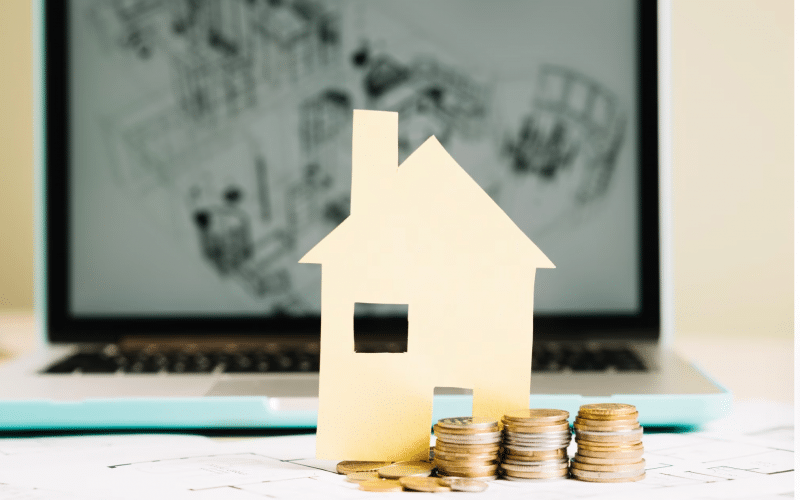Many people’s most valuable asset is equity in their homes. As you pay off your mortgage, your home’s value rises, or you add value by making improvements, so equity typically grows over time.
The value of their home should always be tracked by homeowners. You may be better equipped to use your home equity if you know this information.
To help you decide whether you should use your home equity, we’ve provided this article to show you how equity works.
What Does Home Equity Mean?
Home equity is the value or price at which a homeowner has a financial stake in their house. In other words, it is the market value of the property minus any liens attached to it.
As more mortgage payments are made over time and market forces affect the property’s current value, the amount of equity in the home changes. It can refer to more than just a mortgage loan that has been repaid.
Thus, homeowners can borrow money against this asset to cover important expenses like paying off high-interest debt or covering college costs.
Because the funds are secured by the equity in the home, the interest rate on borrowing based on home equity is typically lower than that on credit cards and personal loans.
Additionally, interest paid on such borrowing is typically tax deductible if the money is put toward home improvements.
So note that:
- Your home’s equity is its current market value, minus any liens like a mortgage.
- You can use the equity in your home as collateral for a loan or a line of credit to access cash.
- You automatically increase your home’s equity when you make a down payment of 20% or more.
- Your home’s equity may change for a variety of reasons, including changes in the neighborhood’s overall market value.
How Does Equity Work With Your Home?
When a home is partially or entirely purchased with the help of a mortgage loan, the lending institution retains ownership of the house until the loan obligation is settled.
The portion of a home’s current value that the owner currently owns is known as “home equity.”
When you put a down payment on a house when you buy it, you first start to build up equity. After that, as mortgage payments are made, a homeowner’s equity keeps increasing.
This is because a specific amount of each payment is designated to lower the remaining principal balance that you still owe.
Additionally, the value growth of your property is another source of equity growth.
How to Calculate the Equity in Your Home
The difference between the appraised value of your home and the remaining balance on your mortgage is your home equity. It merely indicates how much of your house you own.
For instance, if your house is worth $300,000 but you owe $170,000 on it, you have $130,000 in equity.
If the value of your home has increased or you’ve paid off a sizable portion of your mortgage, you may take out a new loan which is usually 80% or 85% of what’s available.
Is It a Good Idea to Take Equity Out of Your House?
Taking equity out of your house comes with the following The following are the advantages:
#1. Lower interest rates:
Since your home serves as the security for a loan or line of credit, they are less risky than other types of financing. As a result, their interest rates are lower than those of unsecured debt, such as credit cards and personal loans.
Finally, if you need to pay off debt with a higher interest rate, this can help you reduce your interest payments and increase your monthly cash flow.
#2. Tax advantages:
Under the 2017 Tax Cuts and Jobs Act, homeowners who borrow money to “buy, build, or substantially improve” their homes are eligible to deduct the interest paid on loans or lines of credit.
Therefore, if the money is used for capital improvements, the interest is deductible. That means that the money you borrow is tax-free.
Lastly, it allows you to obtain the required funds and replace more expensive payment methods.
Cons of Using Home Equity
#1. It attracts borrowing costs:
For home equity loans, some lenders impose fees. Pay attention to the annual percentage rate (APR), which combines the interest rate and additional fees, as you compare lenders. You’ll probably pay a higher interest rate if you include these fees in your loan.
#2. You risk losing your home:
Your home is the security for the home equity debt, so if you don’t make payments, your lender may foreclose on your house. You might end up owing more on your home than it is worth if home values decline.
Therefore, if you ever need to sell your house, it might be more challenging.
#3. You may misuse the money:
It is best to use home equity to finance costs that will pay for themselves down the road, such as home improvements to increase value, college costs, business startup costs, or debt consolidation with high-interest rates.
How Do You Pull Equity Out Of Your House?
There are several ways to take equity out of your home, each of which has advantages and disadvantages:
#1. Home Equity Line Of Credit (HELOC):
A HELOC is a type of second mortgage with an adjustable interest rate that fluctuates with the prime rate and a revolving balance. Lenders may, however, occasionally permit you to obtain a fixed-rate HELOC.
HELOCs frequently have two lending phases spread out over a lengthy period, like 30 years. The first ten years are referred to as the “draw period,” during which the credit line is open and interest-only payments are the only ones that are necessary. The loan then changes to a 20-year repayment schedule that includes principal payments.
#2. Home Equity Loan:
This is a second mortgage with a fixed loan amount, a fixed interest rate, and a predetermined repayment schedule. It operates similarly to a mortgage and frequently has a marginally higher interest rate than a first mortgage.
This is because, in the event of a foreclosure, the first lender in line to be paid back through the sale of the property would be the home equity lender.
#3. Cash-out refinance:
With this loan, you can refinance your existing mortgage for more money than what is owed and take the extra money as cash.
How Can I Use My Home Equity to Make Money?
#1. Use Equity in your home to renovate
Home equity loans are frequently used to renovate or fund home upgrades. You are making improvements to your property with the help of your home equity, which should increase the value of your house.
Additionally, these loans are affordable and can be used to buy, build, or improve a taxpayer’s home.
#2. Make additions to your home.
Making additions to your home is another way to benefit. By increasing your square footage, the addition will not only increase the value of your home but having more space may also save you from having to make an expensive move.
These loans can help fund a project without tapping personal savings.
#3. Use equity in your home to buy an investment property
You could use the equity in your home to obtain the funds you require to purchase a =n investment property such as a factory or office space rather than drawing from your savings.
These loans frequently offer the most affordable interest rate you’ll be eligible for because they are secured by the value of your property.
#4. Start a new business.
Additionally, you can use it to launch a business, whether it’s a franchise or a fully independent venture. You can access a large sum of money all at once with a home equity loan, rather than using up your savings or getting a costly small business loan.
Can I Use Home Equity For Anything?
Lenders typically don’t impose limitations on how you can use a home equity loan. Borrowers frequently use it to make home improvements, pay off credit card debt, or cover expenses like college tuition.
The money from a home equity loan can be used for almost anything, but the following are some common uses by homeowners:
#1. Pay off High-Interest Debts
It may take years to pay off high-interest debt, such as credit card balances. Paying interest rates continuously can result in significant losses over time. However, depending on the loan term, you can lower your interest rate by paying off this debt with a home equity loan.
Home equity loans provide a lump sum payment to pay off high-interest debt.
#2. Make college payments.
An alternative to student loans when it comes to helping your kids pay for college or private secondary education is a home equity loan.
#3. Healthcare Costs and other emergencies
Even if you have health insurance, major surgery that necessitates a protracted hospital stay or prolonged rehabilitation can result in significant debt. It can assist you in paying for unforeseen emergencies in life.
Do You Have to Pay Back Equity?
Yes, you have to pay back your equity.
If you have a home equity line of credit and are making regular payments, you might be looking for a way to reduce your interest costs and pay off your debt more quickly. You might find the assistance you need by making and following a home equity payment plan.
You must first comprehend how each approach pays off to choose the best course of action.
How to Pay Off a HELOC
With a home equity line of credit (HELOC), repayment works similarly to a credit card:
- You can only withdraw funds up to the line’s limit (just like the credit limit on your credit card).
- You are usually only required to pay interest during the draw period, which usually lasts between 10 and 15 years.
During the draw period, you may also make payments back to the principal. When you settle a portion of the principal, the money is added back to your line of credit.
You enter the repayment period after the draw period is over and start repaying the outstanding balance on your HELOC, plus interest.
Finally, note that HELOC interest rates are typically variable, whereas home equity loan interest rates are fixed.
Beware of Equity Prepayment Penalties.
If you pay off your loan before the first three to five years of the repayment plan, some lenders may impose prepayment penalties.
A prepayment penalty might come when you want to pay off debt early, sell your house, refinance, or just pay your mortgage. Before you decide to pay off your loan early, be sure to consult with your lender.
A small contribution above the minimum required monthly payment usually won’t result in a prepayment penalty, but you should read your loan agreement carefully and speak with your lender about the terms before making a decision.
- MODULAR VS MANUFACTURED HOME: What’s Their Differences?
- 401 K WITHDRAWAL HOME PURCHASE: 2022 Guide to Home Purchase
- How To Get A Grant: Best For College & Home Buyers (Updated)
- How Do I Unfreeze My Credit On Credit Karma






